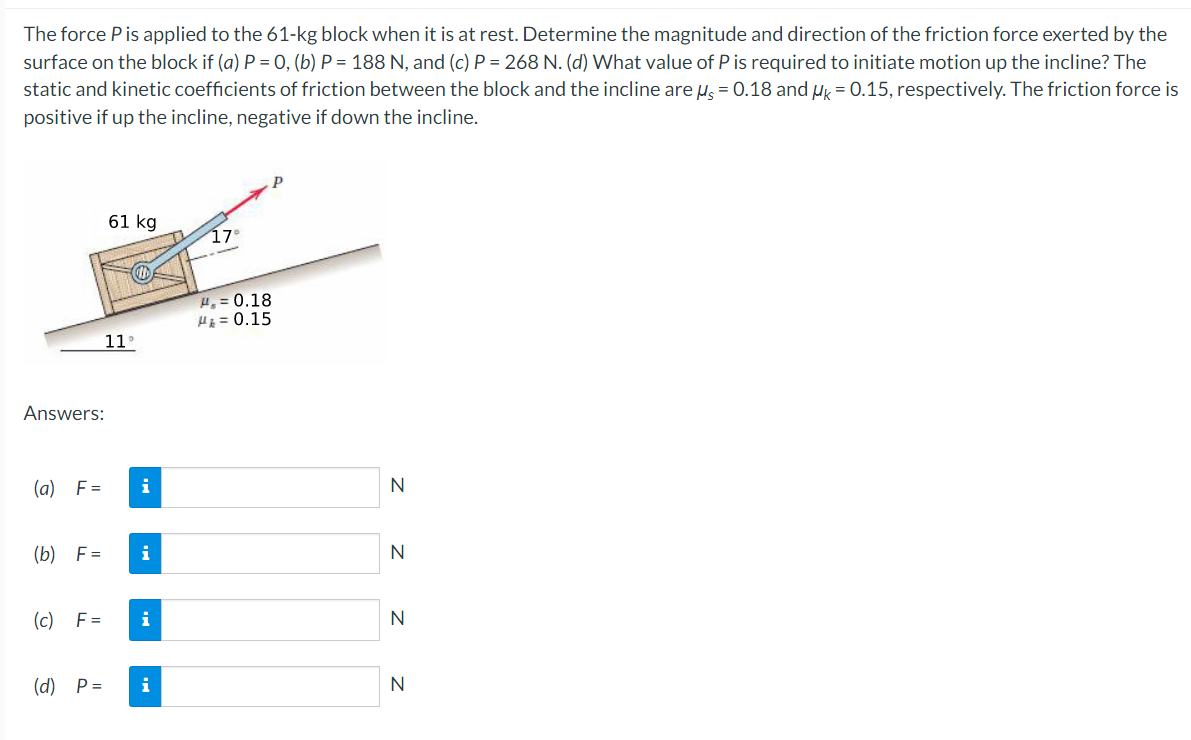The force P is applied to the 61-kg block when it is at rest. Determine the magnitude and direction of the friction force exerted by the surface on the block if (a) P = 0, (b) P = 188 N, and (c) P = 268 N. (d) What value of P is required to initiate motion up the incline? The static and kinetic coefficients of friction between the block and the incline are ug = 0.18 and µ = 0.15, respectively. The friction force is positive if up the incline, negative if down the incline. P 61 kg 17° H= 0.18 HE = 0.15 11 Answers: (a) F= N (b) F = i N (c) F = i (d) P= i N
The force P is applied to the 61-kg block when it is at rest. Determine the magnitude and direction of the friction force exerted by the surface on the block if (a) P = 0, (b) P = 188 N, and (c) P = 268 N. (d) What value of P is required to initiate motion up the incline? The static and kinetic coefficients of friction between the block and the incline are ug = 0.18 and µ = 0.15, respectively. The friction force is positive if up the incline, negative if down the incline. P 61 kg 17° H= 0.18 HE = 0.15 11 Answers: (a) F= N (b) F = i N (c) F = i (d) P= i N
International Edition---engineering Mechanics: Statics, 4th Edition
4th Edition
ISBN:9781305501607
Author:Andrew Pytel And Jaan Kiusalaas
Publisher:Andrew Pytel And Jaan Kiusalaas
Chapter7: Dry Friction
Section: Chapter Questions
Problem 7.71P: The 600-lb cable spool is placed on a frictionless spindle that has been driven into the ground. If...
Related questions
Question

Transcribed Image Text:The force P is applied to the 61-kg block when it is at rest. Determine the magnitude and direction of the friction force exerted by the
surface on the block if (a) P = 0, (b) P = 188 N, and (c) P = 268 N. (d) What value of P is required to initiate motion up the incline? The
static and kinetic coefficients of friction between the block and the incline are ug = 0.18 and µ = 0.15, respectively. The friction force is
positive if up the incline, negative if down the incline.
P
61 kg
17°
H= 0.18
HE = 0.15
11
Answers:
(a) F=
N
(b)
F =
i
N
(c)
F =
i
(d) P=
i
N
Expert Solution
This question has been solved!
Explore an expertly crafted, step-by-step solution for a thorough understanding of key concepts.
Step by step
Solved in 4 steps with 3 images

Knowledge Booster
Learn more about
Need a deep-dive on the concept behind this application? Look no further. Learn more about this topic, mechanical-engineering and related others by exploring similar questions and additional content below.Recommended textbooks for you

International Edition---engineering Mechanics: St…
Mechanical Engineering
ISBN:
9781305501607
Author:
Andrew Pytel And Jaan Kiusalaas
Publisher:
CENGAGE L

International Edition---engineering Mechanics: St…
Mechanical Engineering
ISBN:
9781305501607
Author:
Andrew Pytel And Jaan Kiusalaas
Publisher:
CENGAGE L